Related Research Articles

The Divine Comedy is an Italian narrative poem by Dante Alighieri, begun c. 1308 and completed around 1321, shortly before the author's death. It is widely considered the pre-eminent work in Italian literature and one of the greatest works of Western literature. The poem's imaginative vision of the afterlife is representative of the medieval worldview as it existed in the Western Church by the 14th century. It helped establish the Tuscan language, in which it is written, as the standardized Italian language. It is divided into three parts: Inferno, Purgatorio, and Paradiso.

Purgatorio is the second part of Dante's Divine Comedy, following the Inferno and preceding the Paradiso. The poem was written in the early 14th century. It is an allegory telling of the climb of Dante up the Mount of Purgatory, guided by the Roman poet Virgil – except for the last four cantos, at which point Beatrice takes over as Dante's guide. Allegorically, Purgatorio represents the penitent Christian life. In describing the climb Dante discusses the nature of sin, examples of vice and virtue, as well as moral issues in politics and in the Church. The poem posits the theory that all sins arise from love – either perverted love directed towards others' harm, or deficient love, or the disordered or excessive love of good things.

Cagnazzo is one of the Malebranche in Dante's Inferno, appearing in Cantos XXI, XXII and XXIII.
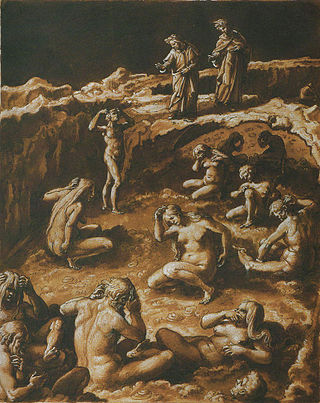
In Dante Alighieri's Inferno, part of the Divine Comedy, Malebolge or Fraud is the eighth circle of Hell. It is a large, funnel-shaped cavern, itself divided into ten concentric circular trenches or ditches, each called a bolgia. Long causeway bridges run from the outer circumference of Malebolge to its center, pictured as spokes on a wheel. At the center of Malebolge is the ninth and final circle of hell, known as Cocytus.

Ciampolo is the accepted name of a character in Dante's Divine Comedy.
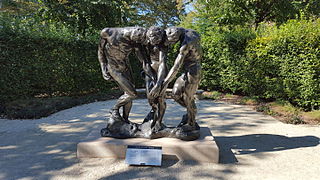
Iacopo Rusticucci was a Guelph politician and accomplished orator who lived and worked in Florence, Italy in the 13th century. Rusticucci is realized historically primarily in relation to the Adimari family, who wielded much power and prestige in thirteenth-century Florence, and to whom it is thought Rusticucci was a close companion, representative, and perhaps lawyer. Despite his association with men born into high political and social rank, Rusticucci was not born into nobility, and nothing is known of his ancestors or predecessors. The exact dates of his birth and death are unknown.

The Divine Comedy has been a source of inspiration for artists, musicians, and authors since its appearance in the late 13th and early 14th centuries. Works are included here if they have been described by scholars as relating substantially in their structure or content to the Divine Comedy.
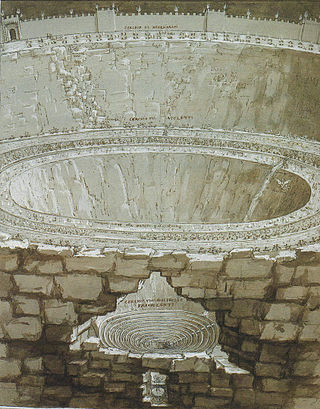
In Dante Alighieri's The Divine Comedy, the City of Dis encompasses the sixth through the ninth circles of Hell.

In Dante's Inferno, Satan is portrayed as a giant demon, frozen up to the waist in ice at the center of Hell. Satan has three faces and a pair of bat-like wings affixed under each chin. As Satan beats his wings, he creates a cold wind that continues to freeze the ice surrounding him and the other sinners in the Ninth Circle. The winds he creates are felt throughout the other circles of Hell. In his three mouths, he chews on Judas Iscariot, Marcus Junius Brutus and Gaius Cassius Longinus. Scholars consider Satan to be "a once splendid being from whom all personality has now drained away". Satan, also known as Lucifer, was formerly the Angel of Light and once tried to usurp the power of God. As punishment, God banished Satan out of Heaven to an eternity in Hell as the ultimate sinner. Dante illustrates a less powerful Satan than most standard depictions; he is slobbering, wordless, and receives the same punishments in Hell as the rest of the sinners. In the text, Dante vividly illustrates Satan's grotesque physical attributes.
Vitaliano di Iacopo Vitaliani was a Paduan nobleman who lived in the late 13th century around the time of Giotto and Dante. He is best known for being a wicked usurer according to Dante in the Divine Comedy.
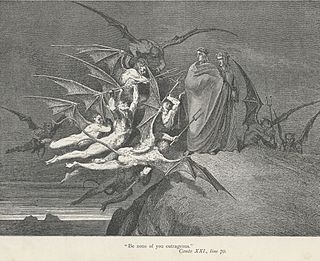
Malacoda is a character in Dante Alighieri's Inferno, where he features as the leader of the Malebranche, the twelve demons who guard Bolgia Five of Malebolge, the eighth circle of Hell. The name Malacoda is roughly equivalent to "bad tail" or "evil tail" in Italian. Unlike other characters such as Geryon, which are based on mythical characters, Malacoda was invented by Dante and is not a mythological reference.

Inferno is the first part of Italian writer Dante Alighieri's 14th-century narrative poem The Divine Comedy. It is followed by Purgatorio and Paradiso. The Inferno describes the journey of a fictionalised version of Dante himself through Hell, guided by the ancient Roman poet Virgil. In the poem, Hell is depicted as nine concentric circles of torment located within the Earth; it is the "realm [...] of those who have rejected spiritual values by yielding to bestial appetites or violence, or by perverting their human intellect to fraud or malice against their fellowmen". As an allegory, the Divine Comedy represents the journey of the soul toward God, with the Inferno describing the recognition and rejection of sin.
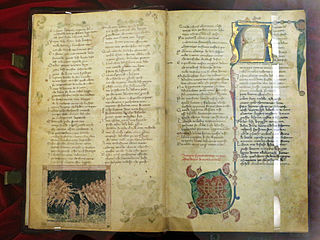
Paradiso is the third and final part of Dante's Divine Comedy, following the Inferno and the Purgatorio. It is an allegory telling of Dante's journey through Heaven, guided by Beatrice, who symbolises theology. In the poem, Paradise is depicted as a series of concentric spheres surrounding the Earth, consisting of the Moon, Mercury, Venus, the Sun, Mars, Jupiter, Saturn, the Fixed Stars, the Primum Mobile and finally, the Empyrean. It was written in the early 14th century. Allegorically, the poem represents the soul's ascent to God.
Calcabrina is one of the demons featured in Inferno, the first canticle of Dante Alighieri's Divine Comedy. Calcabrina's name is possibly meant to mean "grace-stomper" or "frost trampler."

The Malebranche are the demons in the Inferno of Dante's Divine Comedy who guard Bolgia Five of the Eighth Circle (Malebolge). They figure in Cantos XXI, XXII, and XXIII. Vulgar and quarrelsome, their duty is to force the corrupt politicians (barrators) to stay under the surface of a boiling lake of pitch.

Alichino is one of the devils in the Inferno of Dante Alighieri's Divine Comedy. Alichino is a member of the Malebranche, whose mission is to guard Bolgia Five in the Eighth Circle, the Malebolge. Alichino's name is commonly regarded as a garbled version of the Italian word for harlequin, Arlecchino, perhaps for his flying attempt to catch Ciampolo of Navarre in his escape. His only significant contribution to the plot is when he persuades the other devils to leave Ciampolo of Navarre alone. Ciampolo is supposed to summon other sinners from the lake of boiling pitch, on request by Dante. But Ciampolo doesn't call at his friends. Instead, he fools the devils and escapes back to the lake, and Alichino tries in vain to catch him. This causes a fight between Alichino and Calcabrina, which causes them to fall into the lake. The other devils put the blame on Virgil and Dante, though and hunt them vexed.

The first circle of hell is depicted in Dante Alighieri's 14th-century poem Inferno, the first part of the Divine Comedy. Inferno tells the story of Dante's journey through a vision of hell ordered into nine circles corresponding to classifications of sin. The first circle is Limbo, the space reserved for those souls who died before baptism and for those who hail from non-Christian cultures. They live eternally in a castle set on a verdant landscape, but forever removed from heaven.

The second circle of hell is depicted in Dante Alighieri's 14th-century poem Inferno, the first part of the Divine Comedy. Inferno tells the story of Dante's journey through a vision of the Christian hell ordered into nine circles corresponding to classifications of sin; the second circle represents the sin of lust, where the lustful are punished by being buffeted within an endless tempest.

The third circle of hell is depicted in Dante Alighieri's Inferno, the first part of the 14th-century poem Divine Comedy. Inferno tells the story of Dante's journey through a vision of the Christian hell ordered into nine circles corresponding to classifications of sin; the third circle represents the sin of gluttony, where the souls of the gluttonous are punished in a realm of icy mud.
Ciriatto is one of the Malebranche in Dante's Inferno, appearing in Cantos XXI, XXII and XXIII.